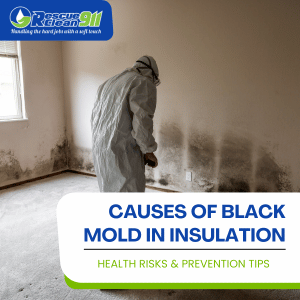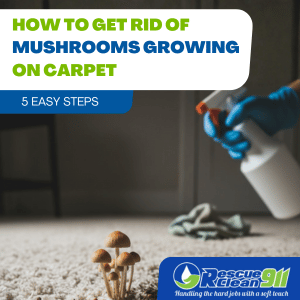Mold infestations can often be difficult to manage in humid environments. So, the question of whether heat can kill mold becomes important for Floridians looking to keep their homes safe and sanitary.
Understanding Mold and Mold Growth
Before taking a look at whether heat kills mold, we need to understand exactly what we’re up against. Mold is a type of microscopic fungi that is commonly known for causing damage to homes and health issues for residents. There are thousands of different mold species, some of which are destructive, while others are harmless. However, specific detrimental strains, such as black mold, can cause severe health concerns making it important to guard against their growth.
The Dangers of Mold
Beyond being a nuisance and an eyesore, mold poses several health hazards. Mold exposure can lead to numerous problems ranging from an allergic reaction to severe respiratory issues. Although the severity of these health effects varies from person to person, no exposure is deemed safe, making mold growth a matter not to be taken lightly.
Florida and Mold Growth
Florida, like other humid states, serves as a breeding ground for mold. This is because the environment that mold favors is usually damp and humid, where moisture problems and organic matter are abundant. Moisture can come from many sources like leaks in roofs, windows, or pipes, or even from flooding. Organic matter, such as food, wood, and even dust, can easily become infested with mold when combined with moisture and a humid environment. All these, when combined, create a perfect balance, fostering mold growth and creating indoor airborne allergens, significantly impacting indoor air quality.
As you can see, understanding and controlling mold growth is super important. Not just to maintain the structural integrity of your home but to reduce exposure and potential health issues for residents.
The Impact of Heat and Humidity on Mold
Now that we understand what mold is and the conditions in which it thrives, let’s delve into the question: Does heat kill mold? The simple answer is yes. High temperatures (around 140 to 160° Fahrenheit) can deactivate mold spores and prevent them from spreading. However, the idea that heat can effectively be an at-home DIY mold solution is inaccurate.
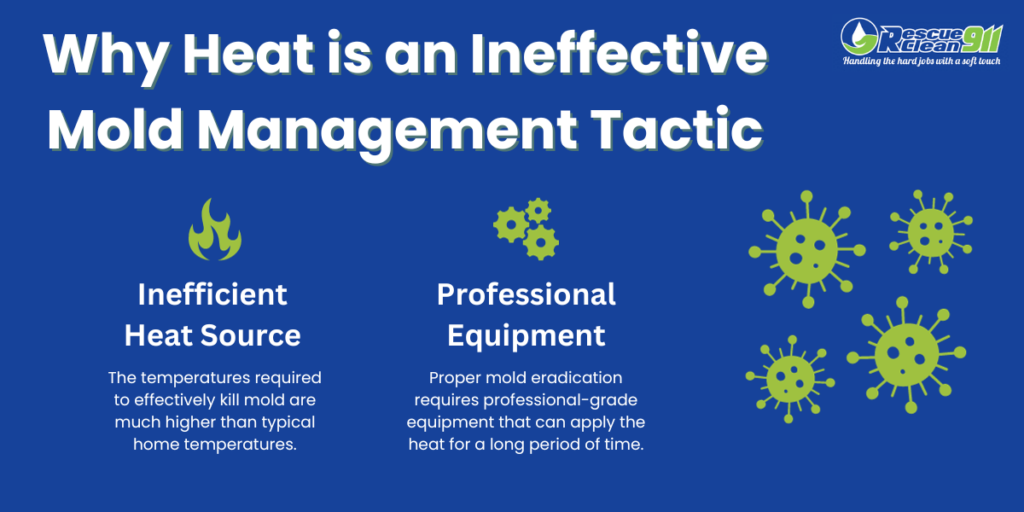
Why Is Heat Not an Effective Mold Management Tactic?
High heat is inefficient at permanently dealing with mold issues. That’s because the target temperature required to deactivate mold spores and prevent their reproduction is usually much higher than average indoor temperatures, and you would require professional-grade mold remediation equipment to effectively eradicate the problem. In other words, turning up the heat in your home as a mold management tactic is not an effective way to deal with a mold issue.
The Relationship Between Mold & Humidity
The relationship between mold and humidity adds another layer of complexity to the issue. A common misconception is that because mold loves water, heat would eliminate it since it evaporates moisture. However, high humidity levels can facilitate the survival and even growth of some heat-resistant mold even in high temperatures.
Common Areas for Mold Growth to Occur
One of the most common places these issues collide is within the home’s air conditioning system. If your air conditioner or HVAC system is not regularly cleaned and maintained, your home can become an ideal environment for mold growth. As the HVAC system regulates the temperature in your space, it also maintains the humidity levels. A poorly maintained unit might not effectively reduce the home’s humidity, increasing the chances of mold growth over time. It can also lead to mold covering the evaporator coil, reducing the efficiency of your AC system.
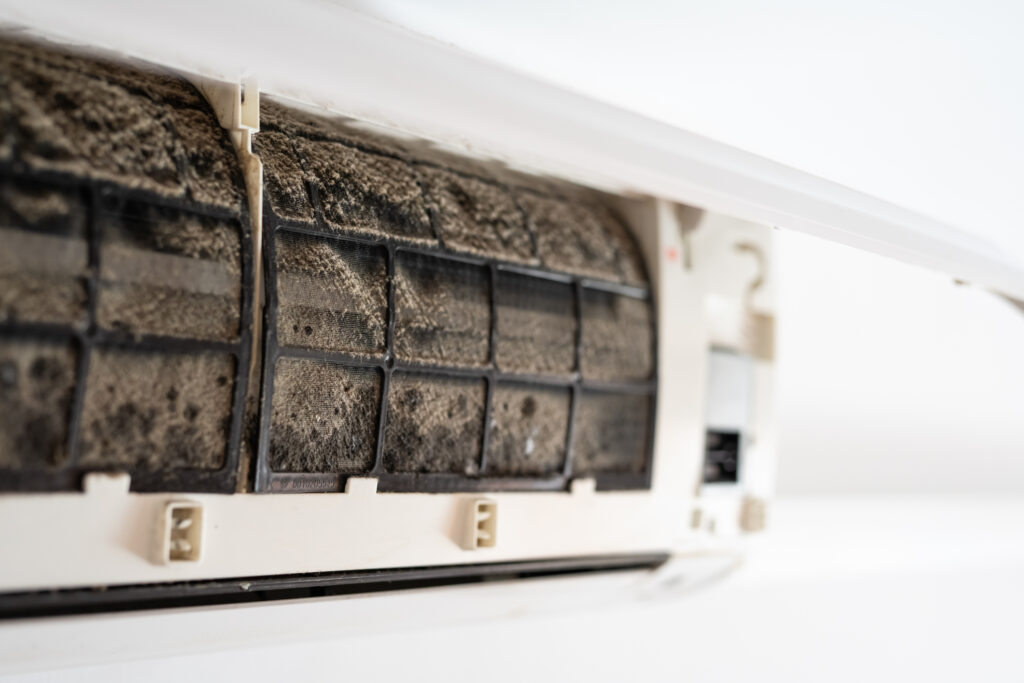
Additionally, appliances like washing machines that operate with both heat and humidity could also create a breeding ground for mold.
Water Damage Leading to Mold Growth
Water damage can further complicate the issue. Lengthy exposure of walls, ceilings, or furnishings to damp conditions makes them susceptible to mold infestation. High heat will not solve such a moisture problem and may even make the situation worse by causing a musty odor from dead mold.
Alternative Treatment Methods
While heat treatment might seem an intuitive solution in the battle against mold, it’s unfortunately not as effective as it seems. Localized heating might kill some mold spores but doesn’t guarantee a complete eradication of the infestation without the use of professional equipment. Additionally, considering Florida’s high humidity, mold is likely to resurface even after heat treatments, leading to a recurring mold problem.
Professional Mold Remediation Services
Given the limitations of heat treatment, turning to a professional mold remediation service is advised. A comprehensive mold remediation process addresses the root cause, like the moisture problem, and ensures thorough cleaning of the affected area, making sure not even microscopic fungi have a chance to grow.
Rescue Clean 911 excels in providing such services. Our team of certified experts can tackle any mold issue, offering tailored solutions for each customer. Providing services like air duct repair, air duct cleaning, and mold remediation, we provide an all-encompassing solution for your home. Not only do we remove the mold, but we also repair the damage caused and provide preventative cleaning, ensuring that the mold doesn’t come back.
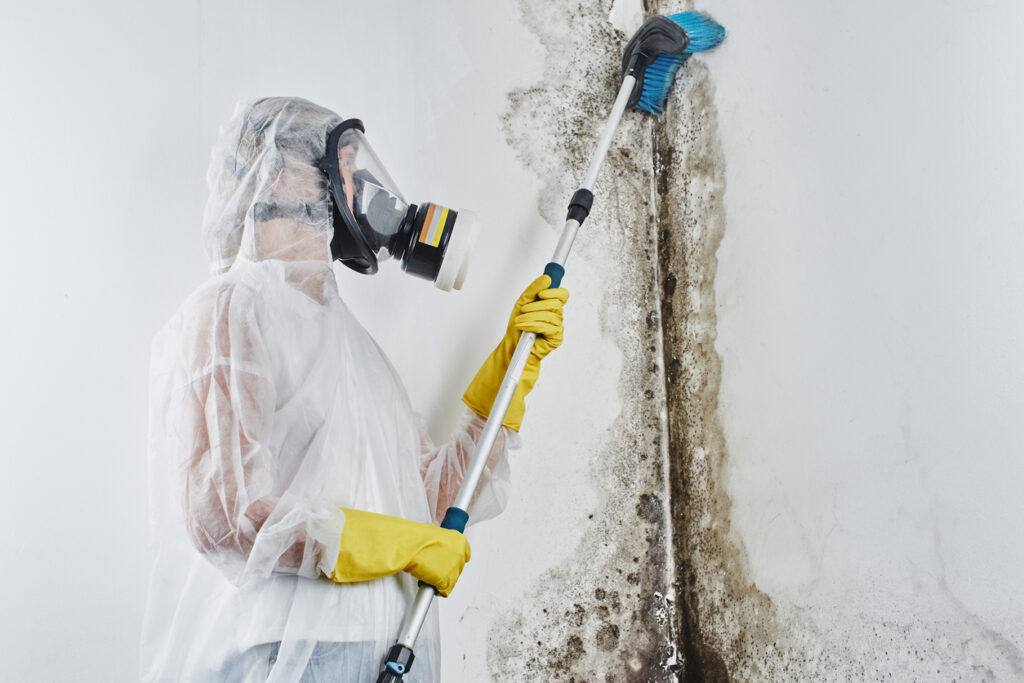
Preventing Mold Growth in the Future
Eradicating mold is only half the battle; the other half is mold prevention. Maintaining a balanced home’s humidity level plays a crucial part in this fight. Keeping indoor humidity below 60% (preferably between 30% and 50%) can keep mold from growing.
Ventilation & Regular Cleaning
Bringing humidity down may involve using an air conditioner or dehumidifier, improving home ventilation, or using household products that absorb moisture. Keeping these appliances properly maintained is essential – from the AC unit to the washing machine, regular cleaning can prevent mold growth even in high-heat environments.
Be Cautious of Moldy Food
When it comes to food safety, it’s necessary to be vigilant, too. Every homeowner ought to ensure their dairy products and other perishable items are stored properly to avoid turning foods into a moldy mess.
Key Signs of a Mold Issue
Having a keen eye for early signs of mold helps in quick detection and removal. Noticing a musty smell, spotting any odd patches on surfaces, or experiencing heightened allergies can be possible signs of mold issues. Don’t hesitate to call certified experts, like us at Rescue Clean 911, to take a look.
How Rescue Clean 911 Can Help
With our dedicated team of certified professionals, formidable expertise, and strategic mold processes, we offer solutions that reinstate the safety of your home. It’s not just about removing mold but also about creating a safe, breathable environment for you and your loved ones.
With proper prevention and timely intervention, mold issues can be managed effectively. Know that we are always here to help, one phone call away, ready to intervene against mold. Don’t let mold compromise your health and the integrity of your home — call the experts at Rescue Clean 911 today!

